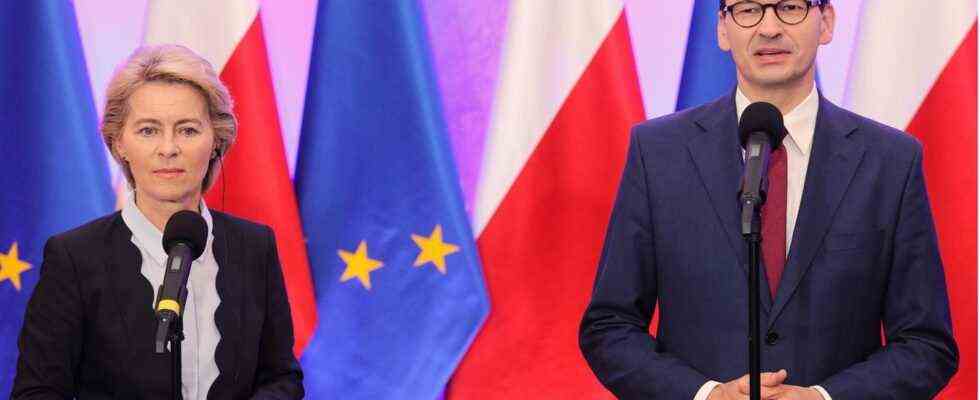Rule of law dispute
Poland accuses the EU of “blackmail”: Von der Leyen threatens a new trial
© Pawel Supernak / PAP / dpa
The mood between Warsaw and Brussels has hit rock bottom after the latest ruling by the Polish Constitutional Court. And Prime Minister Mateusz Morawiecki is not even thinking of de-escalating. Is there a showdown in the European Parliament now?
In the legal dispute between Warsaw and Brussels, the Polish Prime Minister Mateusz Morawiecki accused the EU of “blackmail”. “I do not agree that politicians want to blackmail Poland and threaten Poland,” said the Prime Minister on Tuesday in front of the EU Parliament in Strasbourg.
EU Commission President Ursula von der Leyen previously threatened Poland with severe sanctions for questioning EU law. “We cannot and we will not allow our common values to be jeopardized,” she said on Tuesday in a debate with the Polish Prime Minister Strasbourg. The Commission will act.
EU representatives propose financial cuts for Poland
As specific options, von der Leyen named another infringement procedure, the use of a new procedure to cut EU funds and a renewed application of the so-called Article 7 procedure. The latter could even lead to the withdrawal of Polish voting rights in EU decisions. The EPP chairman in the EU Parliament, Manfred Weber, had previously commented on the cuts in the flow of funds. “We need concrete commitments from Poland so that future EU funds will also flow to Poland in large amounts,” he said on Tuesday in the ZDF “Morgenmagazin”. On the one hand, Poland could not accept EU funds, but at the same time it could no longer “respect the house rules in the house of Europe”.
Weber described the stop of European corona development money to Poland as the “first important signal”. “But further steps must follow,” he emphasized. Europe is an association of free states. “Everyone who becomes a member of this association must respect the house rules,” demanded the EPP chairman.
The EU partners argue – and Putin is happy
The background to the threats from der Leyens and Webers is a ruling by the Polish Constitutional Court, according to which parts of EU law are incompatible with Poland’s constitution and have been classified as unconstitutional. The EU Commission regards this decision as highly problematic because it could give the Polish government an excuse to ignore the unpleasant judgments of the ECJ.
The judgment calls into question the foundations of the European Union, criticized von der Leyen in parliament on Tuesday. “It is a direct challenge to the unity of the European legal order. Only a common legal order enables equal rights, legal security, mutual trust between the member states and the resulting common policy.”
One who is “most of all” happy about the dispute between Brussels and Warsaw is Russia’s President Vladimir Putin, Weber said. “He wants to dismantle the rule of law, he wants a weak European Union, and that’s why we have to ask our Polish friends: Is that really your intention?”
Either rule of law or Brexit
How the conflict could be resolved is completely unclear. From the point of view of countries like Luxembourg or the Netherlands, Poland should actually leave the EU if it does not want to fully comply with Community law. However, Morawiecki recently emphasized that such a step by his country is not up for debate. A large part of the population also rates EU membership positively.
“Poland’s Prime Minister Morawiecki wants one thing without leaving the other,” said FDP MEP and EP Vice-President Nicola Beer at the appointment this Tuesday of the German Press Agency. With the most recent affirmation that Poland’s place is still in the European Union, Morawiecki has clarified his country’s intentions, but still owes the EU to allay its legitimate concerns. If the government in Warsaw wanted to prevent EU funding cuts, it must now approach the EU and ensure that Poland immediately and without a doubt back on the path of the rule of law.

